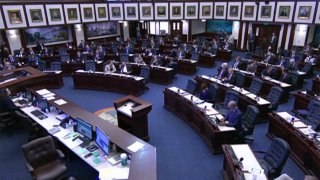
Teachers and business would be limited on how they can discuss racial issues in classrooms and employee training sessions under a bill the Florida House passed Thursday over the strong objection of Black lawmakers.
Proponents said the bill, pushed by Republican Gov. Ron DeSantis, simply states that teachers and businesses can't force students and employees to feel they are to blame for racial injustices in America's past.
Watch NBC6 free wherever you are
>Opponents said the legislation was designed to create racial division for DeSantis' political benefit and would have a chilling effect on the discussion of injustices past and present. Black lawmakers said it is designed to make whites more comfortable about racial issues.
“This is for the governor, and by the governor. Whose life will this bill change for the better?” said Democratic Rep. Tray McCurdy, who is Black. “This bill is a joke. We fight against mask mandates, yet we want to mandate masking history.”
Get local news you need to know to start your day with NBC 6's News Headlines newsletter.
>The bill passed on a 74-41 party line vote. A Senate version of the measure is expected to be heard in its final committee stop next week before being considered by the full chamber. Differences would have to be worked out before the session ends March 11.
The bill reads in part, “A person should not be instructed that he or she must feel guilt, anguish, or other forms of psychological distress for actions, in which he or she played no part, committed in the past by other members of the same race or sex.”
DeSantis held a campaign-like event when he announced he was going to seek legislation to prevent Critical Race Theory instruction in schools and businesses. DeSantis is running for reelection this year and has been building a national presence for a potential 2024 presidential run.
Local
Critical race theory is a way of thinking about America’s history through the lens of racism. It was developed during the 1970s and 1980s in response to what scholars viewed as a lack of racial progress following the civil rights legislation of the 1960s. It centers on the idea that racism is systemic in the nation’s institutions and that they function to maintain the dominance of white people in society.
Republican Rep. Randy Fine said there is nothing in the bill that says teachers can't have uncomfortable discussions with students during history lessons.
"What it says is, you should not be told how to feel, you should not be told it is your fault,” said Fine, who is white. “We’re responsible for our own actions, not the actions of those who came before us.”
At one point, remarks by Republican Rep. Alex Andrade, who is white, were followed by audible disbelief from some Democrats, including a Black legislator.
“I see the concern today in debate against this bill as fear that the market corner on victimhood is suddenly being jeopardized,” Andrade said.
The comment drew a “Wow!” from a Black lawmaker. Rep. Angie Nixon said she thinks that was her, adding she was shocked by the statement and knows she reacted.
“His statements claiming we are playing into a victimhood narrative illustrates the members of this chamber are in desperate need of diversity and inclusion training,” Nixon said in a text message.
The bill was amended on Tuesday to require the expansion of the teaching of Black history, including teaching students about the ramifications of prejudice, racism and stereotyping.
In a phone interview before Thursday's House session, Rep. Fentrice Driskell said the amendments still didn't make the overall bill palatable.
“This bill is not redeemable,” said Driskell, who is Black. “It suppresses the truthful and accurate teaching of history. ... My concern is that we are telling teachers to do their job while also tying a hand behind their back and trying to keep things in parameters of how a child will feel.”



